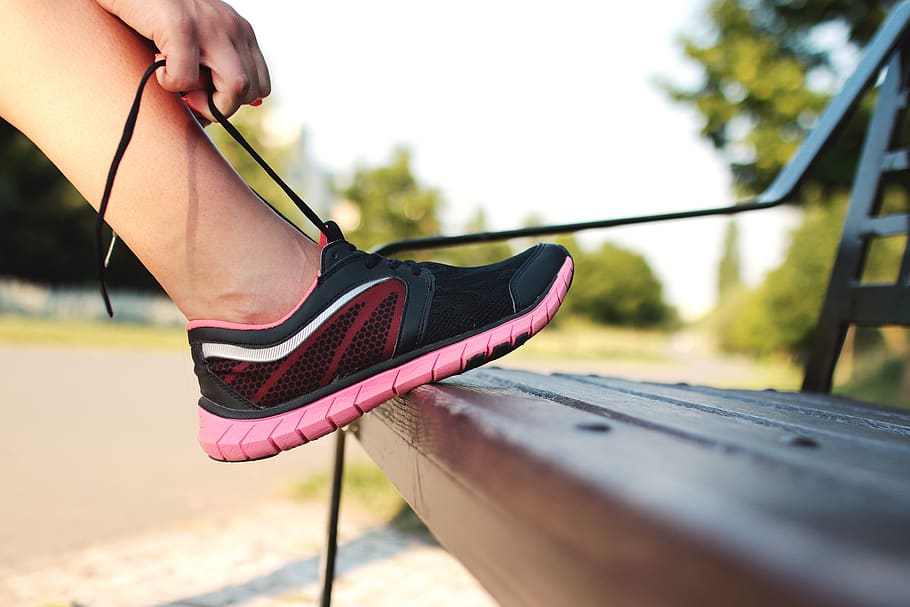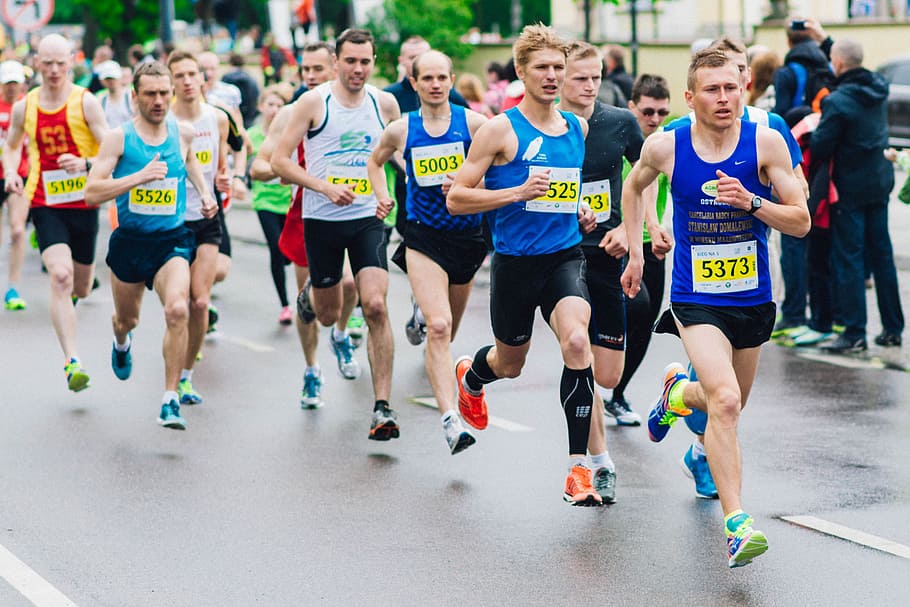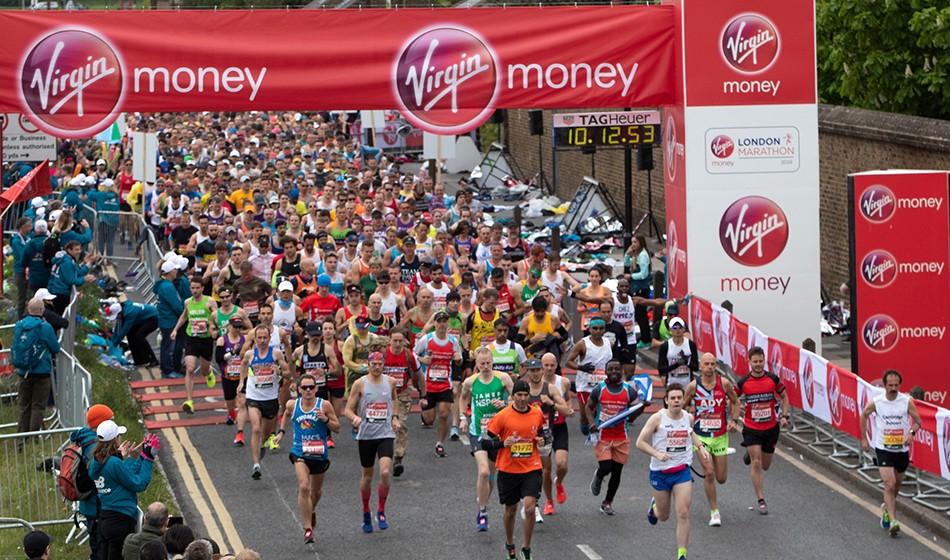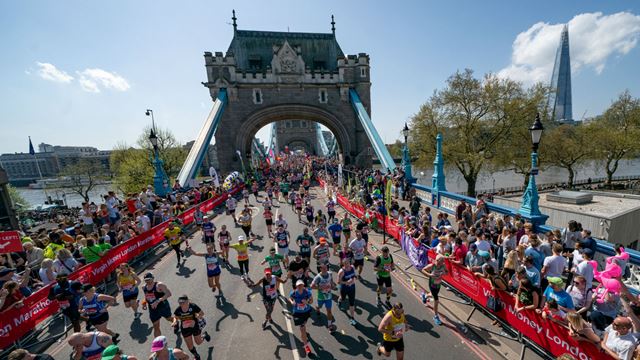Who would run a marathon?! We’re getting tired just thinking about it! But if you’re thinking of taking on the dreaded 26.2 mile challenge, it’s your lucky day. Harry, one of our OJO word wizards, is running the London Marathon for the second time today and he’s kindly shared his top 10 London Marathon training tips.
London Marathon training tips
1. Don’t be a cheapskate 🤑
We’ve all heard the saying ‘all the gear, no idea’. But it really is a good idea to splash out on at least some of the gear. You’re not going to have a comfortable run if you’re wearing cheap trainers that don’t fit properly. There are specialist shops that analyse your running technique on a treadmill to find the perfect shoe for you.
I took advantage of my birthday falling just as I was getting into my training. I was able to direct friends and family to specific running-related gifts, such as a hydration pack and a foam roller. Also, if you’re going to listen to music during the marathon, make sure your headphones are durable and reliable – they’re likely to get drenched in sweat during your training!

2. Baby steps! Build your mileage up slowly 👣
So, you’ve signed up to your first marathon and it’s time to start training. Better head out and run 26 miles straight away, right? Wrong! No matter how good you are at running, if you’ve never come close to running that distance, build up to it slowly or you’re going to wear yourself out and pick up a load of injuries.
As they say, it’s a marathon, not a sprint, and your body needs time to get used to running for an extended period of time. The experts say you should increase your weekly mileage by a maximum of 10% each week – and they’re experts for a reason!
3. Practice makes perfect 🎯
Knowing how far to run, how often and at what intensity can get confusing and stressful, particularly when you’ve got other things going on in your life. Thankfully, there are plenty of free training plans available online to guide you every step of the way. There are also countless apps you can use to track your runs so you have a record of how far you went and what your average pace is.
If you want, you can even go one step further to make your training as seamless as possible. I used MapMyRun to track my training and by paying for the premium version (it costs £27.99 for a year) and typing in my goals, I had my entire training plan mapped out for me, telling me exactly when to run and at what pace.

4. Plan ahead 📋
It seems like an obvious one but when your weekly mileage starts to build up, make sure you’ve got time to fit your runs into your schedule. I was working from home at the start of my training plan so it was pretty easy to go for a run during my lunch break or after work. But it became more difficult to manage once we started going back into the office. It’s hard to motivate yourself to nip out for a quick half-marathon after a day at work and a busy commute home. Putting time aside to train over the weekend is essential.
5. It’s okay to take a break 🛌
Whatever training plan you use, it’s there to guide you to get you in the best shape possible. But it’s not set in stone and it’s okay to go off-piste every now and again. Feeling exhausted after a hectic week? Have a rest and put your feet up. Feeling a tweak in your hamstring? Take a week off. As important as it is to do the right amount of training, it’s equally as important to give your body time to recuperate in order to avoid getting injured.

6. Dress rehearsal 🏃♂️
In the weeks leading up to your race, it’s important to try to simulate the day as much as possible and incorporate this into your training runs. If your marathon starts at 9am, it makes sense to train at this time as much as possible. This will adjust your body to getting up, getting ready and having breakfast at the same time that you’ll be doing on race day.
Also, try to take part in a couple of organised races in the months before your marathon. Whether it’s a full half marathon or just 5km, getting to know the logistics of a race day will take away some of the stresses you might experience when it comes to the real thing. Plus, it’ll do wonders for your confidence. You’ll be surprised at how much of a boost running alongside others and in front of enthusiastic spectators can give you.
7. There is no fuel shortage! ⛽
There’s only so much fuel your body can store. Therefore, it’s important to keep your energy levels topped up. Marathon runners can often be seen squeezing energy gels into their tired mouths to give them an extra boost towards the end of the race.
There are plenty of different options out there. Make sure to do some research and find the one that works for you – some have caffeine in them, for example. If you are going to take gels, make sure to use them in your long training runs as well. If they don’t agree with your stomach, you’d rather not find that out on the day!

8. Say no to alcohol 🍻
This is perhaps the toughest of my London Marathon training tips! I’ll be the first to admit I like a beer or two on a Friday night. Or any night of the week, really! But I took a month off drinking ahead of the marathon for several reasons. Firstly, I mainly did it to lose a bit of unnecessary weight and be in the best possible shape come race day. Plus, it’s a lot more difficult to get up early for a long run on a Saturday when you’ve had one too many the night before.
But there are also some fun sciencey explanations as to why it might be a good thing to take a break from the booze. Alcohol disrupts your sleep, which can reduce your body’s ability to store glycogen, which is essential for maintaining endurance. Drinking can also increase the chance of injury. This is because it builds up the stress hormone cortisol, which slows down the repair process.
9. Practice on the route 🗺️
Obviously, this isn’t possible in all cases – people often travel to other countries to take part in marathons. But if you can, try to do a few of your training runs on parts of the route you’ll be tackling on race day. The race organisers will put the route online well in advance. It’ll prove to be really beneficial in your preparation to see what you’re up against. You may find that parts of the course are particularly hilly. Practicing these sections will mean they’re less of a shock on the day.

10. Remember why you’re running 🥳
When training gets too much (which happens to everybody, don’t worry) or you hit the infamous ‘wall’ on the day, remember what you’re doing it for. Whether you’re running to raise money for a charity, you want to beat your PB or you simply want to prove to yourself that you can finish a marathon, don’t lose sight of your goal. Keep going one step at a time. The relief when you cross that finish line will make all the pain worth it.
🚨 BONUS TIP ALERT 🚨 Enjoy yourself!
I know, I know, easier said than done. Running a marathon is one of the most exhausting things you can do and for most people, they’re not particularly enjoyable. But the party atmosphere of the day is an unforgettable experience. Try your best to enjoy the day, even if your legs are telling you otherwise. Hopefully you found these London Marathon training tips useful – good luck!


















